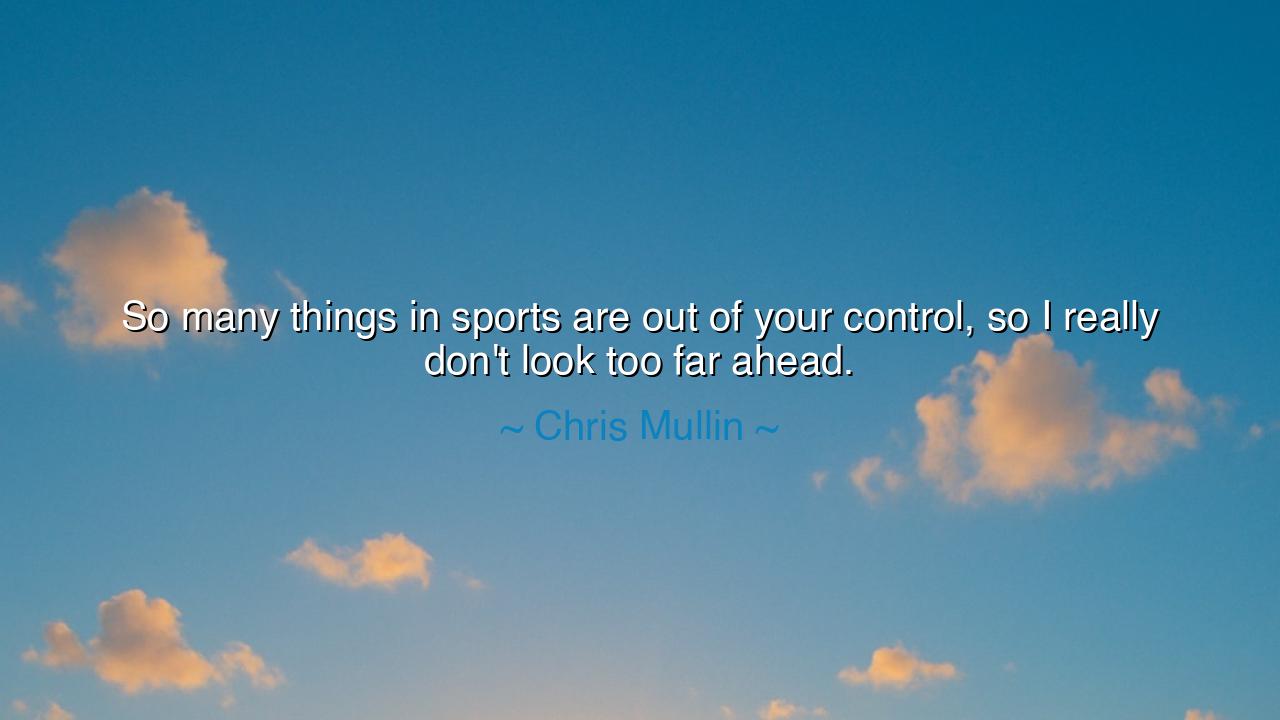
So many things in sports are out of your control, so I really
So many things in sports are out of your control, so I really don't look too far ahead.






The words of Chris Mullin carry the humility and wisdom of a seasoned warrior of the court: “So many things in sports are out of your control, so I really don’t look too far ahead.” Though spoken in the language of athletes, they echo a truth as old as mankind—the truth that life itself is a game with shifting winds, and that the wise do not bind their hearts to distant horizons, but fix their strength upon the present moment.
He begins with the acknowledgment of things beyond control. In sports, one may train the body to perfection, sharpen the mind to precision, and still be undone by injury, by chance, by the brilliance of an opponent, or by the call of a referee. This is no weakness of sport—it is its essence. For it mirrors the greater truth of life, where storms, illness, betrayal, and fate itself can scatter even the best-laid plans. Mullin reminds us that to live well is not to command all things, but to master the few that lie within our grasp.
This lesson has its roots deep in the soil of history. The Stoics, led by Epictetus, taught the discipline of focusing only on what lies within the power of the will. He, once a slave, understood that freedom is not control over circumstance, but control over one’s response to it. Mullin’s words echo this wisdom: the future is a land of uncertainty, but the present—the dribble, the pass, the shot before you—is yours to command.
Consider also the example of Lou Gehrig, who, when struck down by the disease that would end his career and his life, stood before the crowd at Yankee Stadium and declared himself “the luckiest man on the face of the earth.” Though robbed of the future he might have dreamed, he embraced the moment that remained to him. Like Mullin, he knew that to look too far ahead is folly, for tomorrow is not promised; but to seize today with gratitude is the path of strength.
There is also humility in Mullin’s approach. Many speak of long-term glory—championships, dynasties, immortality—but he admits that such visions are not his guide. He chooses instead the discipline of the moment, the day’s work, the practice at hand. For in truth, it is the accumulation of such moments, tended with care, that yields greatness. To seek the distant prize without honoring today’s labor is to build castles in the sand.
The lesson, then, is clear: guard yourself against the illusion of control. Do not bind your joy to what lies far ahead, nor despair when fate reshapes your path. Instead, devote yourself to the small circle of power that is yours: your effort, your attitude, your preparation, your courage in the present hour. This is the way to peace, and paradoxically, it is also the way to greatness.
Therefore, children of the future, heed this wisdom: the world will often move against your will. The ball will bounce strangely, the wind will shift, and tomorrow will refuse to be shaped by today’s dreams. Yet if you master the present, if you pour yourself wholly into what lies before you, then you shall stand unshaken when fortune turns. For control is not the power to command all things, but the strength to rule oneself amidst all things.
Thus, Chris Mullin’s words endure as a timeless teaching: look not too far ahead, but live fully in the moment that is yours. For it is in the humble mastery of today that tomorrow’s victories are secretly forged. Would you like me to also reshape this into a speech-like cadence, as if it were delivered to young athletes before a great contest?






AAdministratorAdministrator
Welcome, honored guests. Please leave a comment, we will respond soon